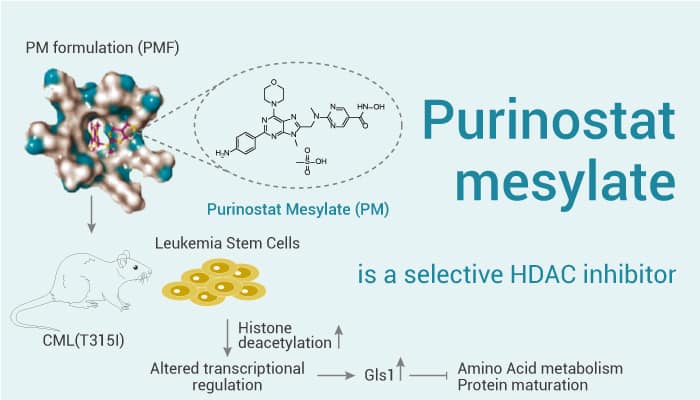Purinostat mesylate is a selective inhibitor of HDAC. This compound inhibits class I and class IIb HDACs with IC50s from 0.81 to 11.5 nM.
Purinostat mesylate (1-10 μM) inhibits HDAC1, 2, 3, and 8. And the IC50s are 0.81, 1.4, 1.7, and 3.8 nM, respectively. It also inhibits HDAC6 and 10, the IC50s are 11.5 and 1.1 nM. Besides, the IC50s are 1072, 426, 690, 622, and 3348 nM for HDAC4, 5, 7, 9, and 11, respectively.
Purinostat mesylate induces apoptosis and affects the cell cycle of LAMA84 and 188 BL-2 cells. And this compound dose-dependently blocked cell cycle progression at G0/G1 phase.
Nextly, Purinostat mesylate effectively suppresses leukemia progression in vivo.

Bioact Mater. 2022 Sep 18;21:483-498
In Non-irradiated C57BL/6 recipient mice, the mice are treated with 5 and 10 mg/kg dosages three times a week for five weeks. As a result, Purinostat mesylate significantly prolonged the overall survival rate. Additionally, it suppressed the leukemia progression in mice.
In Non-irradiated C57BL/6 recipient mice with BL-2 secondary transplantation, Purinostat mesylate shows potently anti-leukemia effects in BCR-ABL(T315I)-induced primary B-ALL mice. What’s more, in this model, Purinostat mesylate completely eliminates GFP+B220+ cells in spleens on day 3 with two times treatments. A and this complete inhibition were maintained for 26 days duration of treatment.
Purinostat mesylate significantly prolongs the overall survival rate and suppresses leukemia progression in mice.
In Non-irradiated C57BL/6 recipient mice with BL-2 secondary transplantation, Purinostat mesylate completely eliminated GFP+B220+ cells in spleens on day 3 with two times treatments. Besides, this complete inhibition maintains for 26 days duration of treatment.
In B-ALL mouse model with BCR-ABL (T315I)-induced leukemia. Purinostat mesylate significantly prolonged the survival rate of BCR-ABL(T315I)-induced B-ALL mice. Survived all mice after treatment for 42 days.
In conclusion, Purinostat mesylate induces apoptosis and affects the cell cycle in vitro. Furthermore, it shows potently anti-leukemia effects in vivo. Purinostat mesylate has the potential for the research of lymphoblastic leukemia.
Reference:
Yang L, et al. Clin Cancer Res. 2019 Dec 15;25(24):7527-7539.